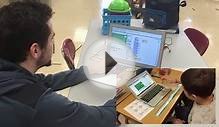
Code.org offers an elementary school curriculum that allows even the youngest students to explore the limitless world of computing. Each of our 20-lesson courses blend online, self-guided and self-paced tutorials with “unplugged” activities that require no computer at all. By the end of each course, students can create interactive games, stories, and art that they can share with anyone. Built on our online Code Studio learning platform, these courses are available in dozens of languages, and already used by millions of students in tens of thousands of classrooms. 98% of participating teachers recommend the program.
For teachers in the United States, Code.org offers high quality, 1-day professional development workshops free of charge to in-service teachers to prepare to offer our curriculum in elementary school classrooms. We also offer a free, self-paced online workshop for educators who can't attend an in-person training.
Code.org has two interdisciplinary modules at the middle school level. Code.org has partnered with the award-winning Project GUTS (Growing Up Thinking Scientifically) to create CS in Science, and Code.org has partnered with Bootstrap to develop CS in Algebra. Each module exists as multiple sets of topical lessons that are able to be integrated into pre-existing Science and Math classes.
In addition, the online courses in our Code Studio platform may be used at all grade levels, and could be worked into a middle school after-school program or as a semester-long computer-programming course. Free, self-paced online professional development is available to help teachers get started.
Exploring Computer Science
Leveraging years of research by the National Science Foundation, Exploring Computer Science is a nationally recognized introductory college preparatory computer science course and includes curriculum, professional development, and assessments. ECS is composed of six foundational units with lessons that are designed to promote an inquiry-based approach to teaching and learning foundational concepts in computer science and highlighting the computational practices and problem solving associated with doing computer science. The PD experience for ECS is based on three major pillars: computer science content/concepts, inquiry, and equity.
INTERESTING VIDEO




 West Chester East High School (colloquially referred to simply as East or WC East) is a public four-year high school located in West Chester, Pennsylvania, United States.
West Chester East High School (colloquially referred to simply as East or WC East) is a public four-year high school located in West Chester, Pennsylvania, United States.







